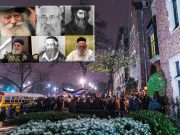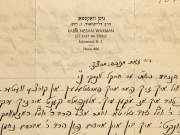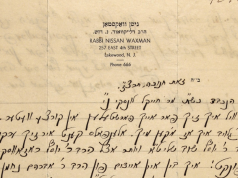
The Midrash recounts¹ that in the second century, in the famous seaport town of Sidon, on the
coast of Lebanon, there lived a married couple who were blessed with wealth and an honored
position in the community. There was, however, a great void in their lives. Although married for
ten years, they had no children. The couple decided to get divorced.
They turned to the great Rabbi Shimon Bar Yochai for advice. He looked at the couple for a long
time, and then he said to them, “I ask only one thing of you both: If you must part, then just as you wed with celebration, so should you part from each other with celebration.”
They took his advice and arranged a great feast. During the evening, the husband raised his cup and said to his wife who was soon to leave, “True, this is the last meal we shall share together, but don’t leave just yet. Before you go, look around at the treasures of this house, choose ‘חפץ טוב’— the most precious jewel your heart desires- and take it back with you to your parents’ house.”
The wife did not respond to his offer. Instead, she mixed and spiced the wine and they drank a lot. The candles burned low in the room and the husband, overcome by a heavy drowsiness, fell asleep. While he was asleep, the wife told her servants to lift him up on the cushions upon which he slept and carry him to her parents’ house. As dawn broke, the husband opened his eyes in a daze and discovered that he was in unfamiliar surroundings.
Astonished, he asked, “Where am I?”
“In the house of my parents,” she said.
“Why?” he asked.
“This is where you asked to be taken. Did you not say to me last night, ‘Take with you the most
precious thing your heart desires?’ To me, dear husband, there is nothing in the world more
precious than you. אין חפץ טוב לי בעולם”
With inexpressible feelings, they embraced. They had found each other again. They now fully
realized how strongly they loved each other.
The next day the couple of Sidon appeared again before Rabbi Shimon Bar Yochai. He had
expected them, and at a glance perceived their happy reunion and deep love. He prayed for the
couple, and in time, after a joyful year, they were blessed with a child.
What is the message of this story? And why didn’t Rabbi Shimon Bar Yochai pray for them in
the first place?
The story of the couple of Sidon, says the Alter Rebbe,² is not only about them; it tells an eternal truth about every marriage, and about the enduring power of love.
You see, when the couple first came to Bar Yochai, their love for each other was conditional,
goal-oriented. If the marriage was not producing a child, there was ultimately no point to it. But
then as they were about to part, they discovered how deeply they loved each other. They began
to celebrate the intrinsic value of love.
So the couple went back to visit the rabbi, not because they had a solution, but because they
knew they wanted to be together. And paradoxically, it was when the couple began to understand the purity of love that has no ulterior motive that their relationship bore fruit.³
So it is with us: when we love our spouse unconditionally, our lives are blessed. When
we love selflessly, that is when the miracles begin to flow into our relationships.4 This is the
great paradox at the heart of emotional life. When we worry only about ourselves, when we
constantly think about how to make ourselves happier, we guarantee that our deepest needs will
go unmet. But when we learn to give our love away unconditionally, we discover
fulfillment and happiness.
Our society puts too much emphasis on being loved and not enough on being a loving person.
The trouble with this focus is that none of us has the power to make others love us. But we all
have the power to give away love to others. And if we do so, we change the kind of person we
are, and the kind of world we live in.
A charming Chassidic story demonstrates this truth: Yankel was a simple Jew who loved the
mitzvah of lulav and esrog, which he performed enthusiastically every Sukkot. He would spend
hours painstakingly picking out the nicest esrog. One year, there was an early winter and it was
difficult for the esrog salespeople to get their regular inventory, so there was a shortage and
prices went up. Yankel was shocked when he heard that an esrog now cost 150 rubles. He went
home saddened and told his wife the news. It was the day before Sukkot, and only one expensive esrog was left.
In Judaism, there is a concept called “mitzvah of the moment,” meaning that the mitzvah at hand now is supreme. So Yankel decided that for this holiday, the mitzvah of lulav and esrog was most important. “Why don’t I sell my tefillin, take the money I get from it and buy the esrog? I won’t need the tefillin until after Sukkot. How I buy them back, well, I’ll figure it out later.”
So he sold his tefillin for 150 rubles and bought the esrog. He came home all excited, and,
finding that his wife was not yet home, he carefully put the esrog down in the kitchen and went
to take a nap. An hour later, he awoke to find that his wife had returned. Excitedly he called out,
“Guess what I bought?! An esrog!”
“How?” she asked.
“I sold my tefillin.”
“How could you do such a thing?” she asked. He explained the mitzvah of the moment. “Nu, let me see it,” she said. “It’s right here,” he replied, “I put it down right here on the kitchen counter.”
“Oy vey!” she shouted, “I came home and made applesauce. I needed a lemon and saw what I
thought was a lemon on the counter and diced it up and mixed it into the pot!”
Cringing, Yankel’s wife expected a scream, an outcry. Instead, Yankel ran toward her, hugged
her, and started dancing. “Why, Yankele?” she asked.
“Because right now, my dear wife, the mitzvah of the moment is to love my wife and control my
anger.”
We all have the power to give away love to others. Yankel was not focused on himself. He was
focused on loving his wife. He understood that Judaism is about getting us to rise above
ourselves, to celebrate the mitzvah of the moment, which is always to love others, to love G-d,
and to be there for them. When we feel that our spouse is חפץ טוב בעולם-the most precious
thing in the world- when we learn to love and cherish our spouse even when they turn an “esrog
into applesauce,” our lives are blessed and miracles can flow.
On Rosh Hashanah, which is fast-approaching, we read in the Torah about how Abraham and
Sarah were blessed with a child after many years of waiting. How did this come about?
Abraham left his sickbed and ignored his pain to show hospitality to three strangers. Sarah rushed to prepare a meal for them. The three strangers turned out to be divine messengers who announced that Sarah would bear a son and ensure the future of the Jewish people.
Sarah and Abraham suddenly found the tables turned, and were the guests at G-d’s table, where miracles were being served. For them, as for us, when we selflessly give love away, the presence of G-d appears, and blessings flow.
____________________________________________________________________________
1 Shir HaShirim Rabba 1:31.
2 Ma’amarei Admor HaZaken HaKetzarim, pp. 460-462.
3 Not every marriage is blessed with biological children, there were many great Jews throughout history who were not blessed with children. Nevertheless, everyone can be blessed with spiritual children.













